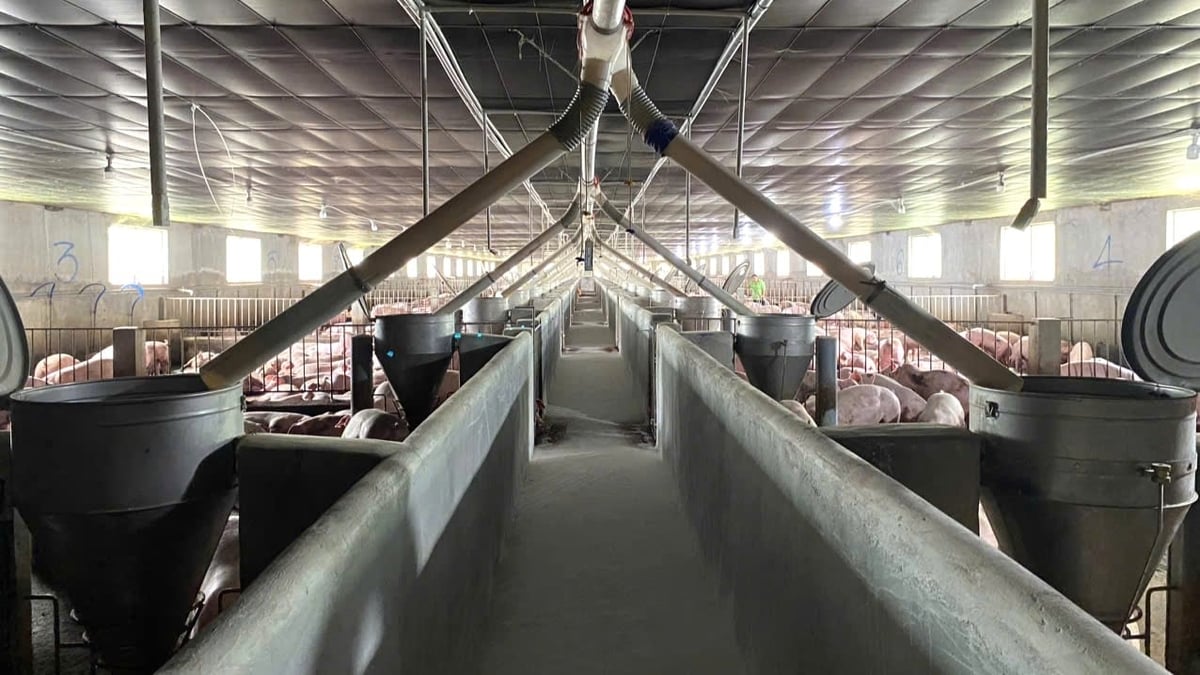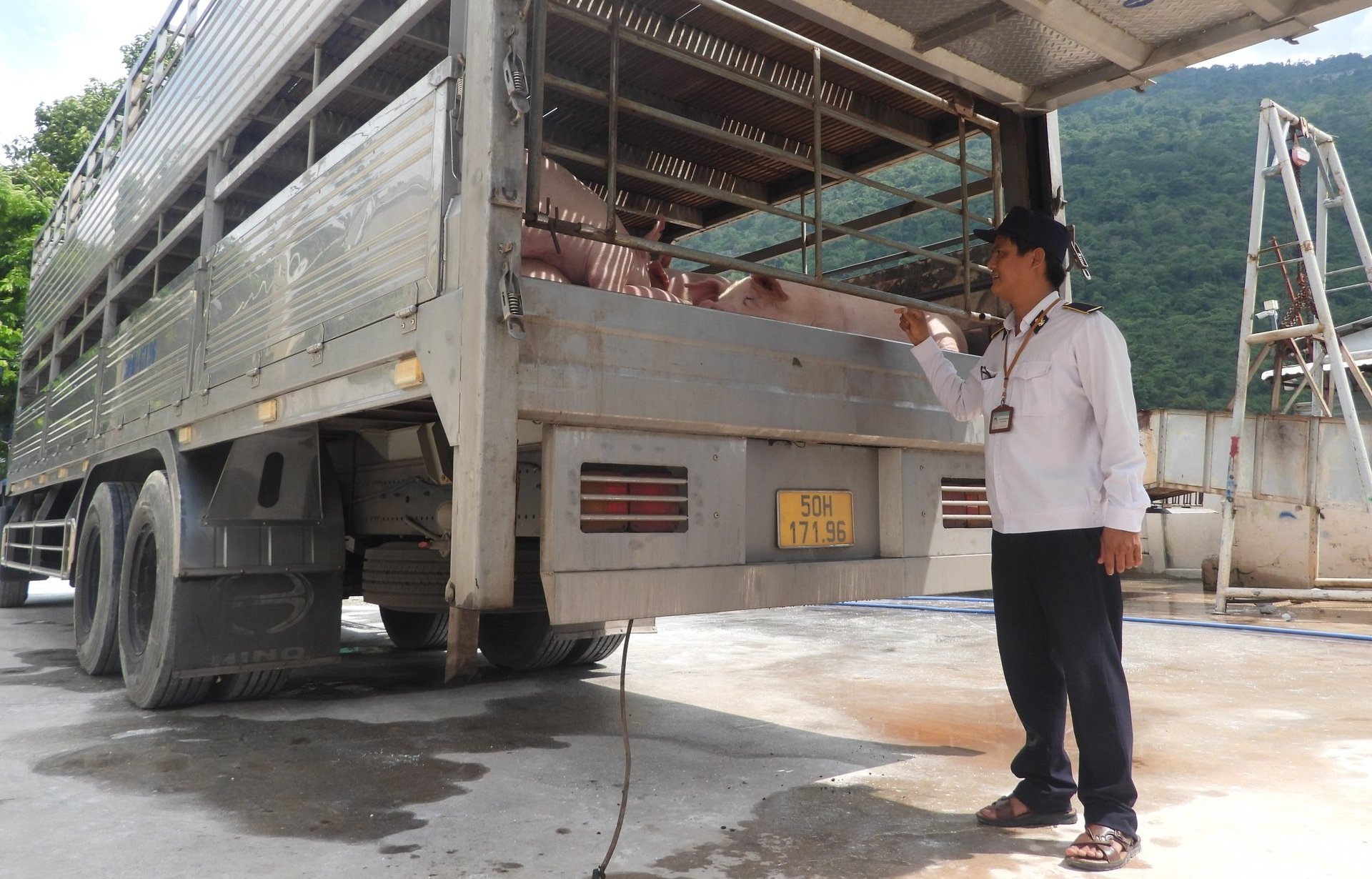November 11, 2025 | 08:40 GMT +7
November 11, 2025 | 08:40 GMT +7
Hotline: 0913.378.918
November 11, 2025 | 08:40 GMT +7
Hotline: 0913.378.918
As the African swine fever virus is still lurking and the risk of new outbreaks remains, Tay Ninh has its full focus on disease prevention and control. Along with the strong directives of the government, many households and livestock enterprises in the province have taken the initiative to build "biological shields" and applied safe, closed livestock farming models to protect livestock.

A corner inside the farming area of Thien Van pig farm. Photo: Tran Trung.
Located in the heart of Tan Bien, Thien Van pig farm is considered one of the prime models of disease-free livestock farming in Tay Ninh. With a closed, circulating barn system and automatic cooling technology, Thien Van ensures a clean environment, minimizing the intrusion of pathogens from outside.
According to Nguyen Van Hai, the farm owner, Thien Van is currently organizing livestock farming in cooperation with CJ Vina Agri Company Limited, with a scale of up to 22,000 pigs per batch. The farm consists of 22 rows of barns, each row raising 1,000 pigs, divided into two separate areas.
Like many other modern farms, Thien Van applies the production procedure according to VietGAHP standards combined with technical advances. The automatic silo pumping system and feed conveyor help save labor, reduce costs, and at the same time ensure a reasonable diet for the pigs.
“The strict, closed-loop farming procedure allows farms to minimize the risk of disease. In particular, the linkage model between farms with businesses brings many obvious benefits, from quality breeds, feed, veterinary medicine, and modern techniques to product output,” said Hai.
Although many households are proactive in preventing the disease, in reality, African swine fever (ASF) is still a major threat. Statistics from the People's Committee of Tay Ninh province show that since the beginning of 2025, the whole province has recorded 24 households in 14 communes and wards suffering from ASF.
Up to 1,181 pigs have to be destroyed, equivalent to nearly 44 tons of meat lost. This figure is not large compared to Tay Ninh’s total pig herd, but it reflects how dangerous African swine fever is, and just a small mistake can cause the disease to break out on a large scale.
According to Tay Ninh Sub-Department of Livestock Production and Animal Health, in the face of the complicated developments of African swine fever, the province is synchronously implementing many solutions to prevent the risk of disease spread. The key task is to discard all infected pigs, isolate and disinfect the barn area. The local veterinary force must also strengthen inspection and strictly handle cases of slaughterhouses having poor hygiene or showing signs of illegally slaughtering sick pigs.

The livestock and veterinary sector of Tay Ninh province has proactively taken measures to prevent the spread of African swine fever. Photo: Tran Trung.
Local authorities have strengthened communication work on barn hygiene and farm biosecurity by popularizing the"5 no's" principle: No concealment of disease outbreaks; no transportation of pigs out of the epidemic area; no slaughter of infected pigs; no consumption of sick pigs; no discard of pig carcasses into the environment.
In the latest directive, Nguyen Van Ut, Chairman of the People's Committee of Tay Ninh, said, "The current situation is of great urgency. Communes and wards with epidemics must immediately encircle the affected area and bring the outbreak under control, not allowing it to spread widely. It is also necessary to strengthen monitoring of pig herds in border areas to promptly detect and prevent smuggling or legalization of pigs from outside sources."
Pig farming plays an important role in food security, accounting for a large proportion of Tay Ninh's livestock structure. Therefore, protecting the pig herd is not only the task of the agricultural sector, but also requires the cooperation of the whole society, from livestock farmers, businesses, authorities to consumers.
African swine fever prevention and control is a long and challenging journey. However, thanks to the government’s decisive action and the proactiveness and creative spirit of farmers, Tay Ninh is gradually building a solid “shield”, both protecting farmers’ livelihoods and contributing to stabilizing the supply of essential foods for the market.
In 1999, CJ Group officially invested in an animal feed production line in Vietnam under the name CJ Vina Agri. With the desire to become the leading animal feed production company in the Vietnamese market, CJ Vina Agri has continuously developed both in scale and stature. To date, CJ Vina Agri has completed a closed-loop Feed - Farm - Food livestock farming process with a total workforce of more than 5,000 people, along with a network of factories and branches distributed in many provinces and cities in Vietnam.
Translated by Samuel Pham

(VAN) Marine resources beneath the sea are being gradually identified and studied, forming the foundation for sustainable exploitation and the development of a blue economy.

(VAN) Residents in the Lang Sen buffer zone can improve their income and preserve wetland biodiversity thanks to the nature-based livelihood models.

(VAN) The Department of Hydraulic Works Management and Construction aims to build a modern, smart, and sustainable water management sector that ensures water security and promotes rural development in Viet Nam.

(VAN) Dong Thap province stands before major opportunities in restructuring its economy, particularly in agriculture and environmental management, which have long been local strengths.

(VAN) The degradation of Cat Ba’s coral reefs is not a random phenomenon but the result of a series of negative factors that intertwine human activities with harsh natural changes.

(VAN) A synchronized scientific strategy combined with stringent management is considered the dual solution to protect the precious swiftlet population and affirm the nation's brand position.

(VAN) The renewal of agricultural extension work based on the green agricultural economy mindset is an essential requirement, contributing to the intellectualization of farmers, promoting green production, and achieving sustainable development.